And Never Let Her Go: Thomas Capano: The Deadly Seducer Read online
ALSO BY ANN RULE
Bitter Harvest
Dead by Sunset
Everything She Ever Wanted
If You Really Loved Me
The Stranger Beside Me
Possession
Small Sacrifices
A Rage to Kill
In the Name of Love
A Fever in the Heart
You Belong to Me
A Rose for Her Grave
The I-5 Killer
The Want-Ad Killer
Lust Killer
. . . And Never Let Her Go
THOMAS CAPANO:
THE DEADLY SEDUCER
Ann Rule
SIMON & SCHUSTER
Rockefeller Center
1230 Avenue of the Americas
New York, NY 10020
www.SimonandSchuster.com
Copyright © 1999 by Ann Rule
All rights reserved,
including the right of reproduction
in whole or in part in any form.
SIMON & SCHUSTER and colophon are
registered trademarks of Simon & Schuster Inc.
Manufactured in the United States of America
10 9 8 7 6 5 4 3 2 1
Library of Congress Cataloging-in-Publication Data is available.
ISBN 0-684-81048-4
eISBN 978-0-7432-0279-4
FOR ANNE MARIE FAHEY
who was not perfect, but who was better than most,
with no little regret that to bring her justice I have
to tell the secrets that she held so dear.
...And Never Let HerGo
Prologue
IT WAS AFTER MIDNIGHT on June 30, 1996, but even so there was a yellow glow behind the sheer curtains framing two small windows on the top floor of 1718 Washington Street in Wilmington, Delaware. That was unusual. The young woman who lived in the third-floor walk-up was known to be an early riser, the first one to arrive at her job, and was almost always in bed well before the eleven-o’clock news flashed on the little television that sat on the radiator near her bed. If the sixty-watt bulbs behind the lacy curtains were whirling red and blue lights, they could not have signaled more alarm to those who knew her patterns.
Silhouettes moved past the windows. There were people in the room, pacing, staring out at the dark street below and the little park beyond, drinking yet another cup of black coffee. Sleep was not an option for any of those who waited there for a knock, a call, anything that might reassure them that the burgeoning dread they felt was only the result of their overactive imaginations.
Fear often begins with the slightest niggle that something taken for granted can no longer be trusted. A slice of a shadow darkens a spot that only a moment before was sunny, and a chill draft destroys what was warm and cozy. What was solid becomes suddenly fragile. It started that way for the brothers, sister, boyfriend, friends, and coworkers of the young woman who lived in that apartment. There
* The names of some individuals have been changed. Such names are indicated by an asterisk (*) the first time each appears in the book.
was nothing dramatic to go on. She had failed to return a few phone calls, she wasn’t home when her boyfriend had called with a last-minute date idea two nights earlier. But gradually they realized that no one had seen or heard from her for at least forty-eight hours.
Anne Marie Fahey was thirty years old; she wasn’t a teenager who had to be checked on. Why, then, did her sister and her friends feel such a sense of urgency? They didn’t live in one another’s hip pockets, didn’t always talk on the phone every day.
Anne Marie—Annie to those close to her—led a busy life, both professionally and socially. She was Delaware governor Thomas Carper’s scheduling secretary, responsible for getting him to all manner of appointments and events on time and for providing him with enough security so that she knew he was safe. She was so efficient and dependable that she’d worked for Carper since the time he was a congressman.
Anne Marie had more than a dozen close friends, a devoted family, and after many disappointments, she believed she had finally found the love she had looked for so long. She lived a life so full and complicated that it was akin to constantly juggling myriad balls in the air. Somehow, she managed it.
The day before—Friday—had passed without any real concern, although even Mike Scanlan, the bank executive she told friends she hoped to marry, couldn’t seem to catch up with Anne Marie. And he was puzzled and a little hurt when she stood him up for a dinner with her brother Robert’s family on Saturday night. He searched his mind for something he might have said to offend her, and couldn’t come up with anything. He called Robert to say he hadn’t heard from Anne Marie.
Mike—and Robert and his wife, Susan—had tried hard to explain Annie’s absence with cautious rationalizations. Maybe she had gotten the date mixed up. Perhaps she had been called away to work late; almost everyone else in the governor’s office was working through the night on this last weekend in 1996 that the state legislature was in session.
Those who gathered to wait in the strange quiet of Anne Marie Fahey’s little apartment thought of a dozen reasons that would mean she was all right and would be coming home soon. But they all knew better. Annie never stood anyone up. She hated to hurt anyone’s feelings. If there was one true thing about her, it was that she tried never to worry or offend anyone. Even if it meant that she herself suffered, she thought always of the other person. If she could see how frightened her sister, her boyfriend, and her friends were now, she would have apologized over and over for scaring them.
ANNE MARIE’S older brother Robert Fahey lived a half hour out of Wilmington. He and Susan had expected Annie and Mike for an early dinner that all of them had looked forward to, but they never arrived, nor did they call. This was so unlike Anne Marie—or Mike for that matter—that Robert and Susan began to worry. When Susan Fahey called her sister-in-law, all she got was an answering machine.
Mike Scanlan was concerned, too. He had surmised that Anne Marie had been home earlier in the day because he’d driven by her apartment and her car was there. And yet she hadn’t returned any of his calls. At 9 P.M. Mike called Annie’s older sister, Kathleen Fahey-Hosey.
“Michael called me and asked me if I had heard from Anne. I responded no,” Kathleen recalled. “As soon as Michael told me they had plans and that Anne Marie didn’t show, I knew something was terribly wrong. . . . She was just so happy with Michael—Michael was her future. She would never break plans on her own.”
Kathleen told Mike she would call him right back, and then she called her sister’s friend Ginny Columbus—who was a coworker at the governor’s office—to see if she knew of any plans Annie might have had. Ginny was instantly alarmed, too, and she called Jill Morrison. Ginny and Jill lived closer to Annie’s apartment than Kathleen did, so they volunteered to go over and check on her.
When no one answered their knocks at Anne Marie’s apartment, the two women asked her landlady, Theresa Oliver, if she had seen her. Theresa hadn’t seen Anne Marie for a day or so, but that wasn’t particularly unusual. Anne Marie’s step was so light that she could come in through the front door and be up the closed-off stairs to her apartment without anyone hearing her. Now, on Saturday night, Theresa walked up to the third floor and found Anne Marie’s door locked, with the dead bolt in place. She opened the door and called Anne Marie’s name—but there was no answer. Fearing that she was intruding, she walked through the living room to the kitchen, peered in the bedroom, but didn’t see Anne Marie.
Jill and Ginny immediately called Kathleen back. “The lights are off, Kathleen, and h
er door was locked,” Ginny said. “Annie’s not there—but her car is parked outside.”
“OK,” Kathleen said, “I’ll be right over.”
Kathleen then did something that might seem an overreaction; she called the Wilmington Police Department to report Anne Marie as a missing person. The detective on duty told her she would have to come down to the station or call from her sister’s apartment. The moment she called Mike Scanlan back, he said he was on his way to pick her up. Both of them felt such a sense of urgency, although they had nothing tangible to go on.
WHEN Kathleen and Mike arrived at Annie’s apartment and spoke with Ginny and Jill, they learned that Annie apparently wasn’t with anyone they might expect her to be with. With a dull sense of acceptance, they realized that since Thursday night, June 27, Annie hadn’t been in any of the places or with any of the people who made up her world as they knew it.
With Kathleen beside her, Theresa Oliver unlocked the dead bolt on the door of Annie’s apartment. Kathleen called her name softly.
There was no answer.
A gush of fetid air washed over them, and they involuntarily held their breaths against the foul, rancid odor. It was initially indefinable, but then they smelled garbage and something rotting.
Kathleen rushed first toward the bathroom; all she could think of was that Annie had fallen in the shower and hit her head on something. She flung the door open, clicked on the light, and pulled back the curtain. The shower was empty. Everything in the bathroom was spotless. For some reason, she looked for Annie’s toothbrush. It was there, where it always was.
Kathleen moved next to the single bedroom. Annie’s bed was all white, with a comforter of white-on-white puffed hearts and ruffly white pillow shams. But it wasn’t made the way she usually made it. Maybe it was her imagination, but it looked to Kathleen as if two fists had yanked the comforter up and then pushed it flat, leaving two indentations.
The little television set that Kathleen’s husband, Patrick Hosey, had given Annie one Christmas sat in its usual spot on the radiator underneath the bedroom window. There was a new air conditioner there, too, and it was turned on. That was why there was such a chill in the apartment on this hot summer night.
Annie’s jewelry boxes were lined up on top of the radiator, as always. Her blouses and dresses hung in the closet from hangers that were all pointing the same direction. Most of her shoes were in their original boxes, where she always kept them, but some of the boxes were scattered on the floor now—as if she had been in a hurry to change her shoes and intended to put things back together when she got home.
Anne Marie was the first to admit she was a compulsive neat freak. Her friends teased her and called her Anal Annie when she went through her little rituals. She arranged her CDs alphabetically, stacked her pennies so that Lincoln’s profile faced the same way, and made her bed even as she was crawling out of it. She actually folded her soiled laundry, rather than just tossing it in the hamper. Kathleen always smiled at that; her sister did her laundry at Kathleen’s house every Wednesday night, and usually had dinner there, too.
The U.S. Open T-shirt Annie had worn when Kathleen saw her last on Wednesday night now lay on the top of the clothes hamper. And there was a long floral-patterned Laura Ashley summer dress folded on a small settee rather than being placed with the rest of the laundry. A small thing, but very unusual for Annie. Kathleen recognized the dress; it was new and one that Anne Marie had bought to wear to the Point-to-Point amateur steeplechase with Mike Scanlan on May 6.
The red oblong box on the floor looked familiar, too. It was from Talbot’s, one of the Wilmington area’s better women’s shops. It hadn’t been opened. Kathleen slid the ribbons free, opened the box, and saw that the Talbot’s seal still held the layers of tissue inside together. But she knew what the taupe garment beneath was; it was an expensive pantsuit, the same suit she had talked Annie out of buying a week earlier because it cost far too much for her budget. They’d had a little argument about that. When had she gone back to buy it?
There were five people in Anne Marie’s apartment: Kathleen, Mike, her friends Jill Morrison and Ginny Columbus, and Ginny’s mother, Virginia. They respected Annie’s privacy, but they had to look around for some clue to where she might have gone, even as they knew it was an intrusion.
Annie didn’t own much, and the furniture she did have was secondhand or the kind of inexpensive stuff that had to be assembled after purchase, but the way she had decorated her place was her and it was charming. There were photographs: family pictures with her brothers and sister one Easter, a candid shot of Anne Marie and Mike taken at her surprise birthday party at Kathleen’s in January, and on the wall a picture of their mother, also named Kathleen. There were Annie’s scruffy old stuffed animals wearing women’s rights buttons, a motley collection of knickknacks that pleased her.
Anne Marie always kept her kitchen almost antiseptically clean. But this was the source of the miasma in her apartment; the whole room smelled of rotting food. The counter was littered with fruit and vegetables long since grown overripe and mushy. The strawberries were brown and had a sickly sweet odor; mushrooms dank as a swamp added to the stench. A garbage can with its plastic liner pulled up was next to the kitchen table, and it, too, was full of decaying food.
Mike shook his head. He knew that Anne Marie hated to keep any garbage in her apartment; when he picked her up for a date, she invariably carried a neat bag of garbage to put in the cans outside. There was no way she would have left her kitchen in this condition.
Looking into the refrigerator, Kathleen found two doggie bags of leftovers from a Philadelphia restaurant, Panorama. The food inside wasn’t spoiled, but it looked dry, as if it had been there for a few days at least. Anne Marie wouldn’t have left all this food out on the counter. She wouldn’t even have kept restaurant food in her refrigerator so long. Kathleen looked at Mike questioningly. Had he and Anne Marie been to this restaurant? He read her mind and shook his head slightly.
Oddly, there were other things on the kitchen counter: prescription medications, sample size, arranged like a row of dominoes; pouches of Rice-A-Roni; pretzels. They hadn’t been opened, but they hadn’t been put neatly in the cupboards, either.
Perhaps most frightening of all, Anne Marie’s purse was there in the kitchen, along with her wallet and all of her credit cards. There was about $40 in bills in the wallet. The day-runner that she used to keep track of all her appointments was also there, but her keys weren’t. She kept her house and car keys on a ring attached to a leather pouch that held a little canister of Mace.
There was some unknown component in this puzzle that they couldn’t grasp, some missing piece. They questioned one another and themselves, looking for some clue that would reveal Anne Marie’s whereabouts. As time went on, their theories grew more outlandish and improbable, anything to make it seem that she was safe. It didn’t matter if she had decided to step out of her everyday life without telling them. It didn’t even matter if she had run away with no plan to come home again. The only thing that mattered was that they needed to hear from her, because the most terrible emotional anguish known to humans is not knowing.
Surrounded by her things, all the funky, sentimental, humorous, silly possessions that made this apartment so special to Anne Marie, this first real home of her own, it seemed to the people who waited there that at any moment the door downstairs would open and they would hear her voice calling up to them. Their Annie had a lovely pansy-eyed face, but her voice could carry a mile when she chose to shout. She could make people laugh with that voice, a beautiful woman who could bellow like a fishwife and then giggle.
Every creak of the old semidetached house made them hope it was her hand opening the door, her feet on the steps. They felt her essence around them wherever they turned. Annie was the most alive person they knew. And still, the more they willed her to come home, the farther away she seemed to be.
For everything they found that seemed normal an
d safe, they discovered something else that was totally atypical of Anne Marie. The disorder alone would be anathema to her. Above all else, this told them she was gone. The fact that Anne Marie’s green 1995 Volkswagen Jetta was parked in its usual spot across the street frightened them, too. That meant she wasn’t off on some errand of her own; she had to be with someone else. But who?
As if there might be some clue there, Kathleen looked to see what CD was in Annie’s player. It was one of her sister’s favorite singers—Shawn Colvin. Annie loved Shawn’s strong, sweet Irish voice and the songs she wrote and performed. She had programmed the CD to play the track with the song “Get Out of the House.”
Many of Shawn Colvin’s songs spoke to Anne Marie; her lyrics were poems full of longing, lost love, the fear of danger and a need to be at home and safe again. But Anne Marie wasn’t home.
At the moment when time becomes important it is relentless and unforgiving, and with each passing moment the fear and apprehension of Anne Marie’s family and friends grew more palpable. It was not possible that Annie should have left of her own volition, that she could have gone away without telling any of these people who loved her.
Anne Marie and Mike should have been with Robert and Susan right now, maybe having coffee after dinner, maybe saying good-bye and getting ready to drive back to Wilmington. But instead, Mike was here, as worried as the rest of them. Kathleen knew that Annie was in love with Mike; she would have returned his calls. She would have called all of them back. Annie hadn’t returned any of her calls since Thursday afternoon.
KATHLEEN couldn’t wait any longer to take action. On Sunday, June 30, 1996, at approximately 12:15 A.M., with the full support of her brother Robert and of Michael Scanlan, the man Anne Marie had only just begun to love, she called again to report to the Wilmington Police Department that Anne Marie Fahey was missing. “I called the police,” she said. “The Wilmington city police. I waited for what felt like an eternity, and they didn’t come, so I called Ed Freel.”

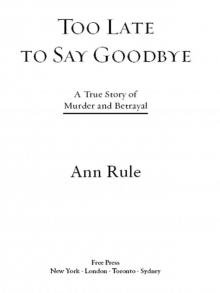 Too Late to Say Goodbye: A True Story of Murder and Betrayal
Too Late to Say Goodbye: A True Story of Murder and Betrayal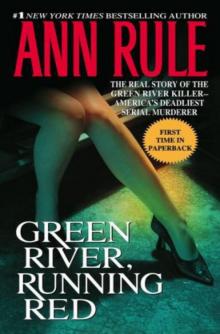 Green River, Running Red
Green River, Running Red Bitter Harvest
Bitter Harvest Dead by Sunset: Perfect Husband, Perfect Killer?
Dead by Sunset: Perfect Husband, Perfect Killer?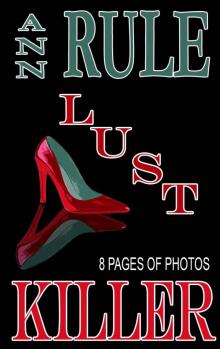 Lust Killer
Lust Killer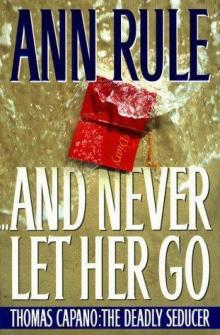 And Never Let Her Go: Thomas Capano: The Deadly Seducer
And Never Let Her Go: Thomas Capano: The Deadly Seducer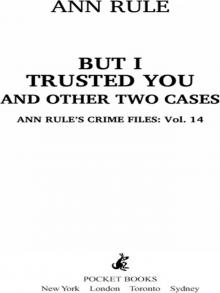 But I Trusted You and Other True Cases
But I Trusted You and Other True Cases Smoke, Mirrors, and Murder and Other True Cases
Smoke, Mirrors, and Murder and Other True Cases If You Really Loved Me
If You Really Loved Me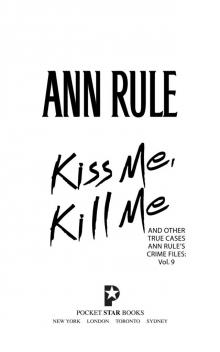 Kiss Me, Kill Me and Other True Cases
Kiss Me, Kill Me and Other True Cases Fatal Friends, Deadly Neighbors and Other True Cases
Fatal Friends, Deadly Neighbors and Other True Cases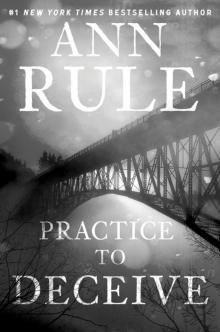 Practice to Deceive
Practice to Deceive Mortal Danger and Other True Cases
Mortal Danger and Other True Cases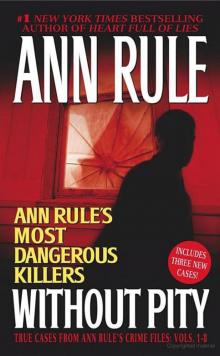 Without Pity: Ann Rule's Most Dangerous Killers
Without Pity: Ann Rule's Most Dangerous Killers Everything She Ever Wanted
Everything She Ever Wanted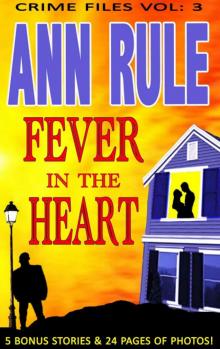 A Fever in the Heart and Other True Cases
A Fever in the Heart and Other True Cases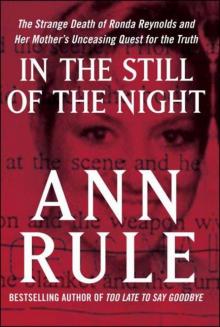 In the Still of the Night
In the Still of the Night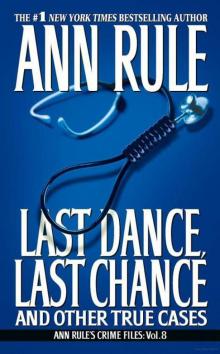 LAST DANCE, LAST CHANCE - and Other True Cases
LAST DANCE, LAST CHANCE - and Other True Cases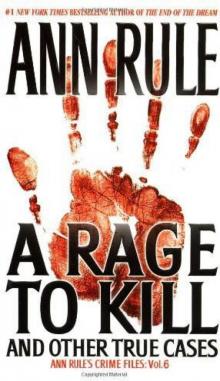 A Rage to Kill
A Rage to Kill The I-5 Killer
The I-5 Killer The Stranger Beside Me
The Stranger Beside Me Everything She Ever Wanted: A True Story of Obsessive Love, Murder, and Betrayal
Everything She Ever Wanted: A True Story of Obsessive Love, Murder, and Betrayal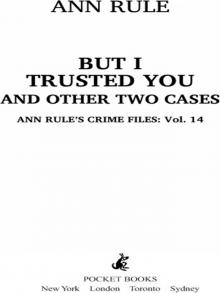 But I Trusted You
But I Trusted You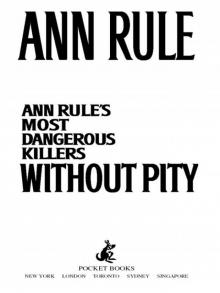 Without Pity
Without Pity Kiss Me, Kill Me
Kiss Me, Kill Me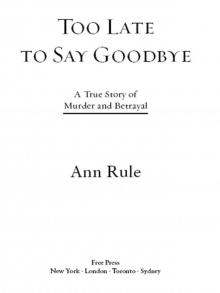 Too Late to Say Goodbye
Too Late to Say Goodbye Lying in Wait
Lying in Wait Fatal Friends, Deadly Neighbors
Fatal Friends, Deadly Neighbors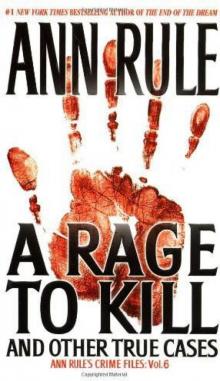 A Rage to Kill: And Other True Cases
A Rage to Kill: And Other True Cases And Never Let Her Go
And Never Let Her Go Lying in Wait Ann Rule's Crime Files Vol.17
Lying in Wait Ann Rule's Crime Files Vol.17 Blood Secrets: Chronicles of a Crime Scene Reconstructionist
Blood Secrets: Chronicles of a Crime Scene Reconstructionist No Regrets
No Regrets Mortal Danger
Mortal Danger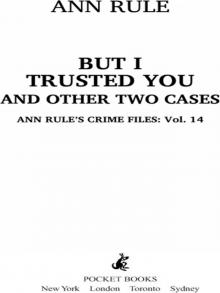 But I Trusted You: Ann Rule's Crime Files #14
But I Trusted You: Ann Rule's Crime Files #14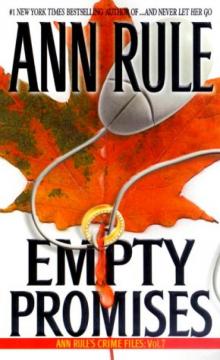 Empty Promises
Empty Promises Dead by Sunset
Dead by Sunset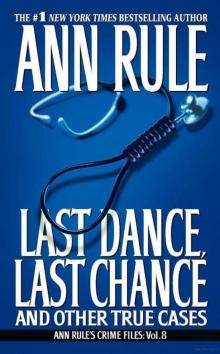 Last Dance, Last Chance
Last Dance, Last Chance Don't Look Behind You
Don't Look Behind You